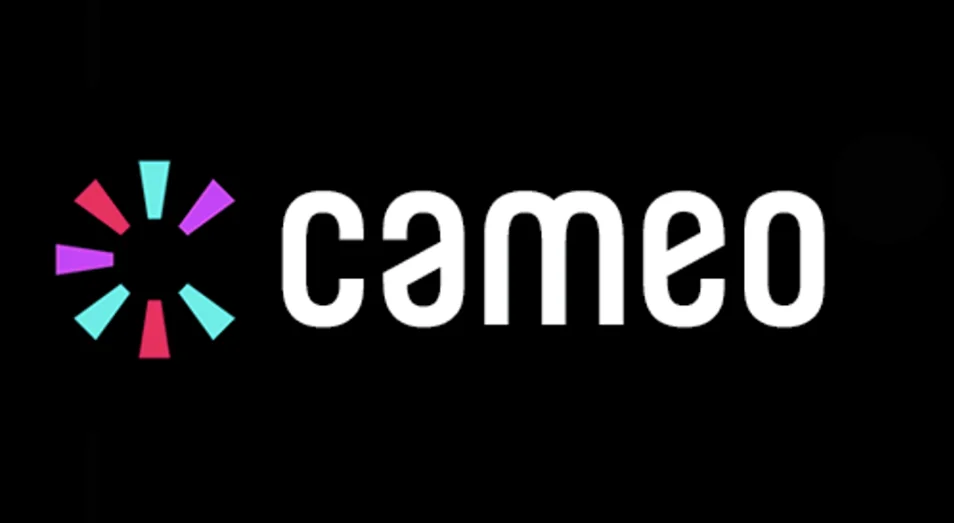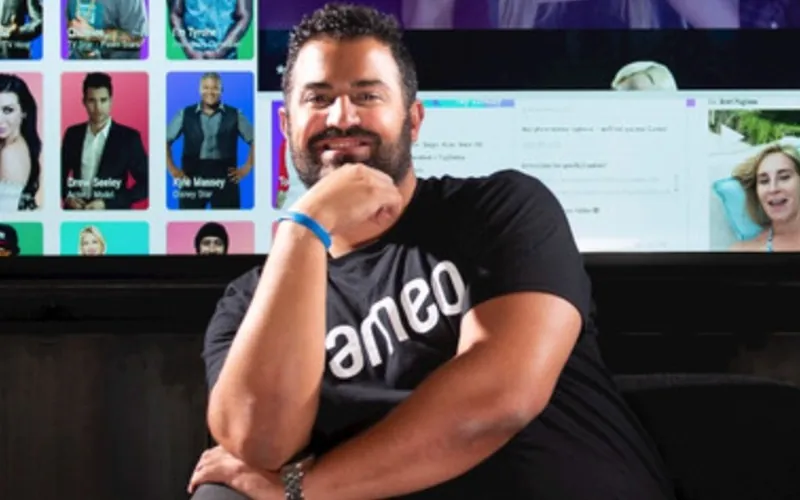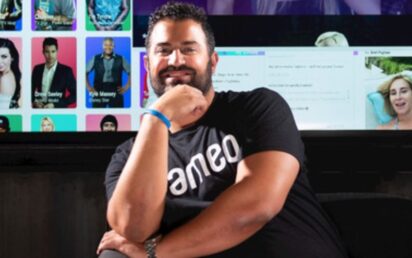When Chris Townsend’s Dad Stephen was diagnosed with bowel cancer in December 2023, he knew he had to do something to cheer him up.
The 62-year-old underwent surgery in January and was preparing to embark on six months of gruelling chemotherapy and had time on his hands.
It was then that his son, who is the managing director of Manchester-based What Media, had a moment of inspiration.
“Dad was sitting in the hospital with not much going on and was really apprehensive about the chemo,” he said.
“I thought it would be nice if I could do something to distract him so I went on Cameo.”
Cameo was founded in 2016 by a trio of US entrepreneurs – Steven Galanis, Brit Martin Blencowe and Devon Townsend – and has created millions of video messages.
Chris Townsend explained: “I got The Royle Family actor Ricky Tomlinson to do a personalised message for £75.
“I wrote three or four sentences but Ricky Tomlinson turned it a seven-minute message. It was really improvised and he made a number of TV recommendations for Dad to watch.
“It took less than 24 hours to turn the video around and really lifted my Dad’s spirits.”
I canvassed the views of my LinkedIn network and this was not an isolated experience.
Digital marketing executive Joe Seager and some friends clubbed together to get a personalised message from Cameo for a friend’s 40th birthday.
“It was from a wrestler called Mick Foley,” he said. “I ordered well ahead of when I needed it, expecting it to take some time, but it was done and back with me in a little over an hour.
“The video was around three minutes long which is longer than some of the short messages I’ve seen as examples on the site and the birthday present was well received. An all-round good experience I would certainly consider doing again.”
Nathan Selby is a director of channel marketing agency Resultful and has used Cameo twice to get personal messages from drag queen Cheryl Hole and Amanda Lovett from The Traitors.
“Both were super easy to deal with and absolutely nailed the brief without any prompts,” he said. “I have heard of people having bad experiences though, whereby their ‘celeb’ reads off a script for 10 seconds and that’s it. Both of the above delivered a good 90 seconds+ for about £30.”

They’re the sort of gushing testimonials that contributed to Cameo’s meteoric rise with thousands of ‘stars’ joining the platform and producing millions of memorable videos.
The accolades and investment quickly followed.
In 2020 the startup topped Fast Company’s list of the ‘World’s Most Innovative Social Media Companies’.
When Cameo announced a $100m Series C funding round in March 2021, it took the company’s valuation to just over $1 billion and transformed it into a unicorn.
The company’s charismatic co-founder Galanis was even identified by Goldman Sachs as one of the ‘100 Most Intriguing Entrepreneurs of 2021’.
In a recent podcast interview he revealed his nickname at kindergarten was ‘the Mayor’.
Actors turned to it during the pandemic with James Buckley – who is best known for playing Jay Cartwright in the Channel 4 comedy series The Inbetweeners – reportedly becoming a ‘Cameo millionaire’ on the back of all the video messages he was producing.
Sports stars and politicians have also found Cameo a lucrative source of income with Reform UK leader Nigel Farage charging around £70 ($90) for a typical 40-second birthday message or pep talk.
According to the small print, 75 per cent of the booking fee goes to the celeb and the remaining 25 per goes to Cameo. It’s the ultimate ‘win-win’.
However, Cameo has just hit a high-profile roadblock after its ‘Business Cameo’ service fell foul of authorities in the US.
Launched in 2020, Business Cameo allows businesses to hire celebrities to record videos endorsing their goods or services.
Now Cameo’s owner – Baron App Inc – has just been told to pay $100,000 in penalties after New York Attorney General Letitia James secured a bipartisan, 30-state settlement for failing to ensure consumers knew that videos promoting products were paid endorsements.
Dragons’ Den star Steven Bartlett fell foul of the UK authorities when two adverts he featured in for Huel and Zoe were banned after the Advertising Standards Authority said they were misleading.
Huel and Zoe promoted the products on Facebook and despite the ‘sponsored’ label on the ad, the ASA declared the ads didn’t go far enough to demonstrate he’s an investor in Zoe and director of Huel.
In the case of Cameo, what raised eyebrows was that its finances meant that they couldn’t even afford to pay the original $600,000 penalty – just three short years after becoming a unicorn.
So what went wrong at Cameo and what does it mean for the wider tech sector?
The first thing to say is Cameo is still very much open for business.
I browsed the website today and for £365 you can get a personalised message from actor Tom Felton, who played Draco Malfoy in the Harry Potter series, or £190 from former Chelsea captain John Terry.
If your budgets are a bit tighter, you can get a message from ex-Southampton footballer Matthew Le Tissier for just £27.
The second thing to say is I reached out to Galanis on LinkedIn for a comment but he didn’t respond – although he has remained active on the platform.
He’s continued to give talks and last week advertised for a ‘rock star full stack engineer’ to join Cameo.
One theory about Cameo’s current travails is it was a tech company for the pandemic.
‘It’s just not good enough’: Female founders call for Innovate UK reform
People stuck at home turned to it for some light relief and celebrities unable to work signed up to it to earn extra income.
However when the pandemic ended, so did Cameo’s appeal.
The company’s problems have been widely discussed on forums like Reddit.
One contributor calling himself ‘Sevargmas’ wrote: “It has definitely gone downhill. I looked for a couple of different people that my wife would have been surprised by.
“I was going to put together a montage when she finished grad school but I couldn’t find a single person that I looked for. Even when you sort by highest amount, the names on there are not that impressive, which is understandable.
“If you were a celebrity and stuck at home during Covid, what better way to spend your time and earning some extra dollars and probably hearing some funny stories.
“But now Covid has ended and celebrities are either working or travelling, essentially is situations that don’t allow them to drop what they’re doing and make a quick 30-second video, they probably suspended or deleted their accounts.”
In last week’s episode of The Rest is Entertainment podcast, journalist Marina Hyde described it as a ‘small and gimmicky business’ while her co-host Richard Osman said ‘it might be the most 21st Century story of all time’.
Osman, a former presenter of the BBC One TV quiz show Pointless, claimed Cameo’s growth was hindered by its inability to attract the bigger stars.
“What happens is what always happens in these stories,” he added. “You start to grow, people start investing in you and they need you to grow more and more and more and more.”
He described Cameo as a ‘really nice business’ but the problem was ‘everyone wants to be Elon Musk’.
In order to chase growth they launched an advertising arm where celebrities would endorse your products, which is where it came unstuck.
The videos weren’t properly disclosed as paid endorsements, which violated endorsement rules issued by the Federal Trade Commission (FTC) and New York’s consumer protection laws.
It was during this process that Cameo’s financial challenges were laid bare as it emerged the company was unable to pay the initial $600k fine.
I’ve not been able to find any reference to the fine and Cameo’s apparent cashflow problems on Galanis’s various social media accounts.
History will ultimately decide whether Cameo is more than just the tech startup for a pandemic, but its story is another stark reminder of the topsy turvy nature of the world of tech.


